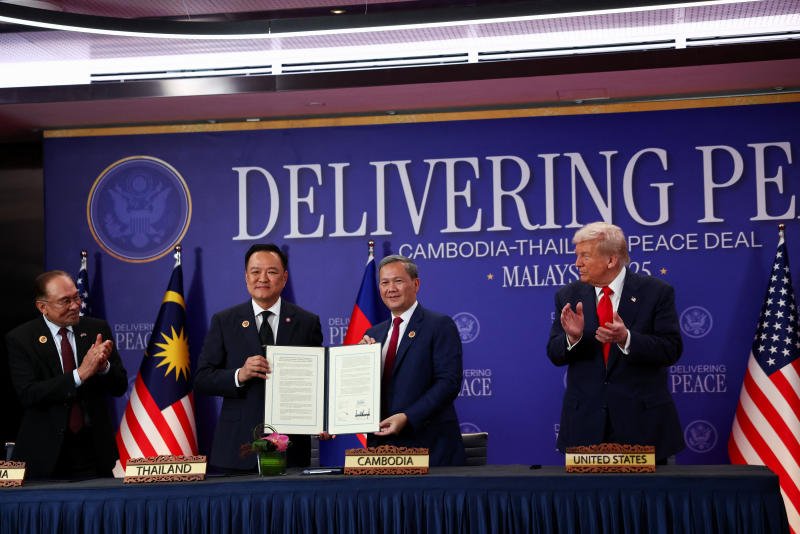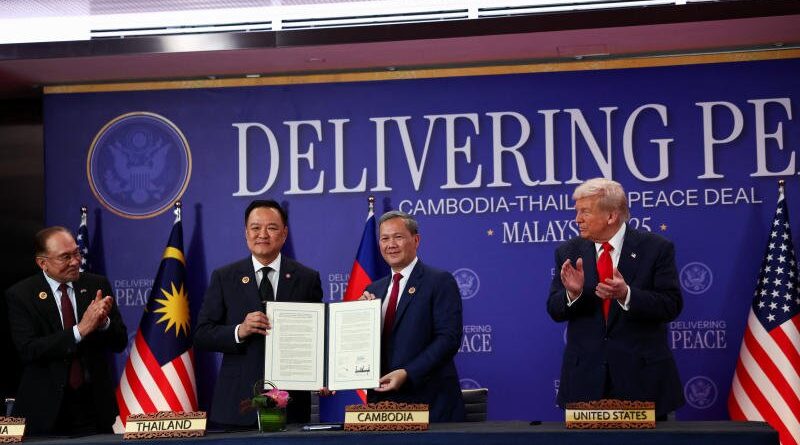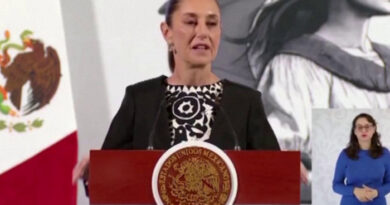Thailand faces uphill battle in mending ties with Cambodia after ceasefire

A recent peace agreement between Thailand and Cambodia signed in the presence of US President Donald Trump seeks to de-escalate tensions between the Southeast Asian neighbours following a deadly border dispute but questions remain over whether the accord will yield tangible progress.
The expanded ceasefire accord cemented on Oct 26 in Malaysia has been met with growing skepticism in Thailand where the government of Prime Minister Anutin Charnvirakul faces internal pressure from the public and key members of the armed forces. They question whether it will ultimately resolve or even ease the conflict at a time of growing nationalistic sentiment.
While Mr Trump has taken credit for the deal, touted by Washington as historic, the absence of key player China, which sought to play a mediator role, has led to concerns that it may be a precursor to another episode of geopolitical rivalry between the superpowers if the agreement falters.
Under the joint declaration, Thailand and Cambodia will implement a series of steps, including removing heavy weapons from the border and conducting demining operations. When the measures are in place and hostilities cease, Thailand will release 18 Cambodian soldiers.
Thailand has already started removing heavy weapons such as tanks from the border area, according to army spokesman Maj Gen Winthai Suvaree.
A high-ranking Thai army source told Kyodo News that all key points in the declaration must be achieved “collectively” not selectively, underscoring the importance of the government and army moving in the same direction to follow through on it.
The source, who spoke on condition of anonymity, also revealed that the military, unconvinced that Cambodia intends to fully comply with the declaration, has already prepared a “backup plan” in case Phnom Penh violates the accord.
“The army will evaluate from time to time, if the process moves in the same direction and tension eases,” the source said, adding that the return of the Cambodian soldiers will be “the final step.”
Tensions spiked this year between Thailand and Cambodia, which have conflicting territorial claims.
In May, a Cambodian soldier was shot dead by Thai armed forces and ensuing clashes in July killed dozens of people. Mr Trump used his threat of tariffs at the time to end the fighting between the Asian neighbours and the two sides agreed on a ceasefire in late July.
The current Anutin government is in a better position than the previous one, local pundits say, given its stronger cooperation with the influential military.
Still, implementation of the steps stipulated in the joint accord will hinge on how it can manage the recent wave of nationalism, as seen in increased support for the armed forces, especially those put in charge of the Thai-Cambodia border.
Former prime minister Paetongtarn Shinawatra was removed by the Constitutional Court following a leaked telephone conversation with former Cambodian prime minister Hun Sen in which she sounded conciliatory towards him while critical of the commander of an army division in the border area.
“The government must ensure that Thai citizens are involved and be informed; otherwise, nationalism could escalate and extend the conflict,” said Panitan Wattanayagorn, a security and foreign affairs expert.
Of the challenges that must be addressed for the ceasefire agreement to hold, he cited the surge in transnational scam operations based in Cambodia as pressing for the Thai side, saying that close coordination with and involvement of China in the effort to clamp down on them are necessary.
China, for its part, has been seeking to mediate in the dispute despite its absence from the recent joint declaration. Under the accord, Thailand, a key strategic partner for the United States, and Cambodia, which has closer ties with Beijing, are set to boost information-sharing and suppress transnational crimes.
Hun Sen, who is now the president of Cambodia’s Senate but remains its most powerful political figure, has hailed the document as a step towards easing or ending tensions with Thailand. In a sign of difficulty ahead, however, he said in a social media post that Cambodia had never asked Thailand to reopen border crossings, as Bangkok maintains.
The border closure was done “unilaterally” by Thailand amid the clashes and would not harm Cambodia, he said, adding it is up to Bangkok whether to keep the border closed for “even 500 years.”
Restoring bilateral ties will take time and commitment from both sides and the participation of local communities is also critical, according to Kavi Chongkittavorn, a veteran journalist on regional affairs.
“Programmes must be prepared to ensure that local communities can meet and promote mutual trust,” Mr Kavi said, adding that such confidence can be built through increased local trade and exchanges that have been hindered by the dispute.
Source – Bangkok News




